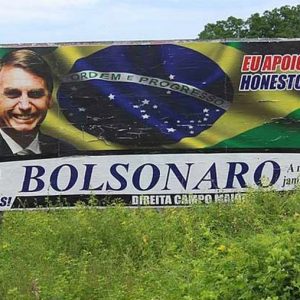Before Electing Bolsonaro, Brazil Slashed Emissions 70%. Nobody Cared
Brazilian President Jair Bolsonaro says the Amazon is Brazil’s to exploit, and the world should stop meddling in it. He’s wrong, but the resentment that thrust him into office has a history, and it’s one more of us must acknowledge if we’re to save the “lungs of the planet.”

13 May 2019 | Last week, Brazil’s top security adviser said that the Amazon forest was his country’s to exploit, regardless of the impact on greenhouse gas emissions.
“I don’t accept this idea that the Amazon is world heritage, this is nonsense,” General Augusto Heleno Pereira told Bloomberg. “The Amazon is Brazilian, the heritage of Brazil and should be dealt with by Brazil for the benefit of Brazil.”
He made the comment even as charismatic Kayapo leader Chief Raoni launched a three-week tour of Europe to send a competing message: namely, that the world needs the Amazon intact if we’re to meet the climate challenge, and that indigenous people like himself can help keep it that way – if we help them do so.
Until now, that help has been sorely lacking – despite the fact that Brazil slashed its greenhouse-gas emissions a staggering 70 percent from 2005 to 2015. To put that into perspective, it reduced its emissions more than the entire European Union did, and it did so at tremendous cost to powerful agricultural players.
That’s partly what sparked the backlash against President Luiz Inácio “Lula” da Silva’s environmental policies that eventually swept Bolsonaro into power, and it’s one of the reasons developed countries have to help forested countries like Brazil finance the emission-reductions that that end up helping us all.
Such finance is a key part of the Paris Climate Agreement, but just 3 percent of dedicated climate finance and 1 percent of media attention focus on the natural climate solutions, such as improving the way we manage our forests, farms, and fisheries, that can get 37 percent of the way to meeting the Paris Agreement’s two-degree target.
Ironically, Brazil is just beginning to reap a small reward for reducing emissions from deforestation and degradation of forests (REDD+), as the United Nations’ Green Climate Fund (GCF) earlier to make the first results-based REDD+ payouts to the country for the emissions it reduced in 2014 and 2015.
That payment, for $96 million, covers roughly 19 million tons of emission-reductions and is earmarked for an ecosystem restoration program called Floresta+. It could be followed by nearly three times that amount if Brazil can put a lid on the recent surge in deforestation.
These payments pale in comparison to the billions that agribusiness giants can rake in by destroying the forest, but they are just one way the world can work together to end deforestation and reverse climate change.
Please see our Reprint Guidelines for details on republishing our articles.

